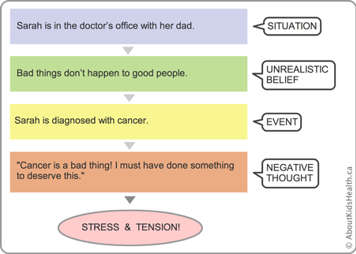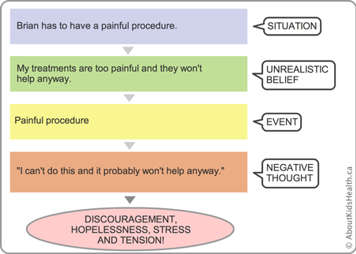Becoming aware of your thoughts
Although you cannot always control the things that are stressing you out, you can control how you react to them. The way you feel about things results from the way you think about things. If you change how you think, you can change the way you feel.
Helpful versus unhelpful thoughts
Helpful thoughts lead to good feelings and emotions. These thoughts can help you feel less stress and tension. Here are some examples of helpful thoughts.
- I’m really good at biology.
- I'm not a great guitar player, but I have fun playing!
- I can get through this round of chemo.
Unhelpful thoughts can cause negative feelings and emotions. These thoughts can also lead to a lot of stress and tension. Here are some examples of unhelpful thoughts.
- I won’t do well on the next math test.
- I’m missing so much school. I’ll never catch up!
- I can’t make it through this round of chemo.
Unhelpful thoughts come and go for everyone, but when you spend too much energy on your unhelpful thoughts, you can feel hopeless or sad a lot of the time.
Catastrophizing
One type of unhelpful thinking is called 'catastrophizing'. A catastrophe is a disaster or something horrible, like a shipwreck or an earthquake that kills many people. But catastrophizing is when we think that something really bad or horrible has happened when what really happened is actually not so terrible.
Here is an example of how some young people may have catastrophizing thoughts.
Carrie feels really sick after receiving chemo and starts to wonder if it isn’t working. She starts to think:
"What if the chemo isn’t working! Or what if I keep feeling like this? My body won’t be able to keep any food in and I will die!"
Carrie turned a fairly small negative event (not feeling well after chemo) into a catastrophe ("I will starve and die!")
Have you ever catastrophized about something related to your cancer or treatment? If so, why don’t you write down what it was and how you felt?
Realistic versus unrealistic beliefs
An unrealistic belief is something that you may think is true but actually is not. These unrealistic beliefs can then lead to cycles of other unhelpful thoughts and stress. They can increase your pain and other symptoms.
Here’s an example.

In this example, the unrealistic belief caused the unhelpful thoughts. The belief that bad things don’t happen to good people is clearly unrealistic. Getting a serious illness such as cancer can happen to anyone. Sarah’s unrealistic belief caused her to feel that she had done something to deserve cancer (an unhelpful thought) and led to stress and tension.
If you practice recognizing your unrealistic thoughts and beliefs, you can examine them and turn them into realistic ones. This can help you feel better about yourself because your thoughts are more in line with reality.
A more realistic thought for Sarah would be: "Getting cancer is scary, but it’s not my or my family's fault. I am going to work with my health-care team and do what I can to stay strong and help my treatment be as effective as possible."
Here is another example.

Brian’s unrealistic belief about his treatment led him to feel really bad.
A more realistic thought for Brian would be: "I have had this painful procedure before and made it through. It hurts a lot for a short time, but it can help a lot for a long time to come."
In the next section, we will discuss some of the ways to change your unhelpful thoughts and beliefs into helpful ones.






